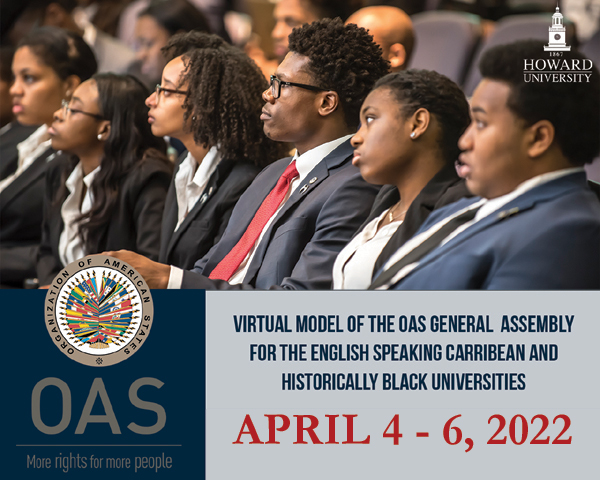MOAS
Virtual MOAS for the English-Speaking Caribbean
1. ABOUT THIS MOAS |
The purpose of the MOAS is to promote democratic values among the youth of the Hemisphere and to familiarize students with the priorities of the Inter-American agenda and the work of the OAS.
Prior to the MOAS, students will meet virtually in their Working Groups and draft one resolution with the support of MOAS Authority. Draft resolutions must be submitted to [email protected] prior to April 4th.
During the MOAS, students will meet in their assigned committee on their assigned day to debate and vote upon the draft resolutions. Check the Schedule of Events for more information.
It is critical for MOAS Authorities and all delegates participating in the MOAS to have a thorough understanding of the Rules of Procedure, as well as all the MOAS documents:
MOAS Rules of Procedure (PDF) (Word)
Modus Operandi | Modus Operandi (Word document)
Authorities | Committee Secretaries
Working groups
Schedule of Events:
April 4th: General Committee (Schedule)
April 5th: Committee on Juridical and Political Affairs (CAJP) (Schedule)
April 6th: Inter-American Council for Integral Development (CIDI) (Schedule)
Draft Resolutions:
General Committee:
Res.WG1
Res.WG2
Res.WG3
Committee on
Juridical and Political Affairs
Res.WG1
Res.WG2
Res.WG3
Inter-American Council for Integral Development
Res.WG1
Res.WG2
Res.WG3
Nomination
form (for those students who would like to run for a
position for next year's MOAS)
Country Assignment
Agenda of Topics
Reading material: This material is intended
to help students in their preparation on the
topics of the Committees
Working groups
Code of Conduct
Verbal Note to OAS Missions
Instructions for drafting a resolution
2. HOW TO REGISTER | REGISTRATION FEES |
The participation fee per delegation of 6 students is US$385. This fee is non-refundable.
Registration fees can be paid through wire transfer (for international delegations (universities outside the US)) or ACH transfer (direct deposit) for university accounts in the USA.
If paying by check, please mail it to the address below:
To: Organization of American States (OAS)
Attn: Department of Financial Services
Address: 1889 F. Street, N.W., Washington, D.C. 20006, USA.
NEW: The registration deadline has been extended to February 20th.
3. DELEGATIONS AND COMMITTEES |
General Committee (GC)
Committee on Juridical and Political Affairs (CAJP)
Inter-American Council for Integral Development (CIDI)
During the Model, students will meet in their assigned Committees on their assigned day to debate the draft resolutions.
4. COUNTRY AND TOPIC ASSIGNMENT |
The MOAS Program Coordinator will assign the countries to the delegations once
the registration fee is received.
See country assignment table.
Each Committee will be assigned 3 different topics (topic 1, 2
or 3). Each Working Group will address one topic and formulate a draft
resolution.
5. WORKING GROUPS |
Delegates will be distributed by the MOAS Team (once the country is assigned) into 3 working groups per Committee. Working Groups will meet virtually at least one month prior to the MOAS and will draft a resolution on the topic assigned by the MOAS Team to be debated at the MOAS.
6. PREPARATION FOR THE MODEL |
In order to participate successfully in an OAS Model, it is critical for students and teachers to understand and follow the Modus Operandi and the MOAS Rules of Procedure. Faculty advisors play an essential role in the preparation of their students.(Role of Faculty Advisors)
As soon as students have been registered, they are encouraged to follow the
steps of the Pyramid for Participation in a MOAS.
Students must conduct general research on the assigned topic (Agenda of Topics)
and check the reading material. They must
research on the policies of "their" country on the topic they will be debating
before drafting their Position Papers and General Statements.
The MOAS program will provide training sessions. Once the registration form has been submitted, students can
also join a free
course on Political Diplomacy offered by Howard University Graduate School
(optional).
In addition, delegates must be familiar with
Prior to the Model, delegates will be assigned to
Working Groups where they will
discuss their
proposals and draft their resolutions.
Instructions for drafting a resolution are provided in the
MOAS Rules of Procedure
and will be discussed during this course and the training
sessions.
Draft resolutions will be discussed by all delegates in the Committees on the
assigned days of the Model. These
documents
will be subject to approval, disapproval or amendments by other delegates.
Also check
Guidelines for the Resolution debate.
7. RELEVANT DOCUMENTS |
MOAS Rules of Procedure
Modus Operandi
MOAS Authorities
Schedule of Activities (General Committee,
CAJP and CIDI)
Agenda of Topics
Reading material: They are intended for the
students in their preparation on the topics of the Committees
Code of Conduct
Country Assignment
Guidelines for writing a resolution
8. SPONSORING A DELEGATION |
In an effort to expand university participation in this virtual MOAS, the Model OAS encourages donors to sponsor a delegation of students to join this Model. The cost to sponsor a delegation is $385USD and it covers registration fees for 6 student delegates. Sponsors will be mentioned at the opening and closing ceremonies of the Model and their logos will be included on the schedule of events, as well as on the MOAS website.


